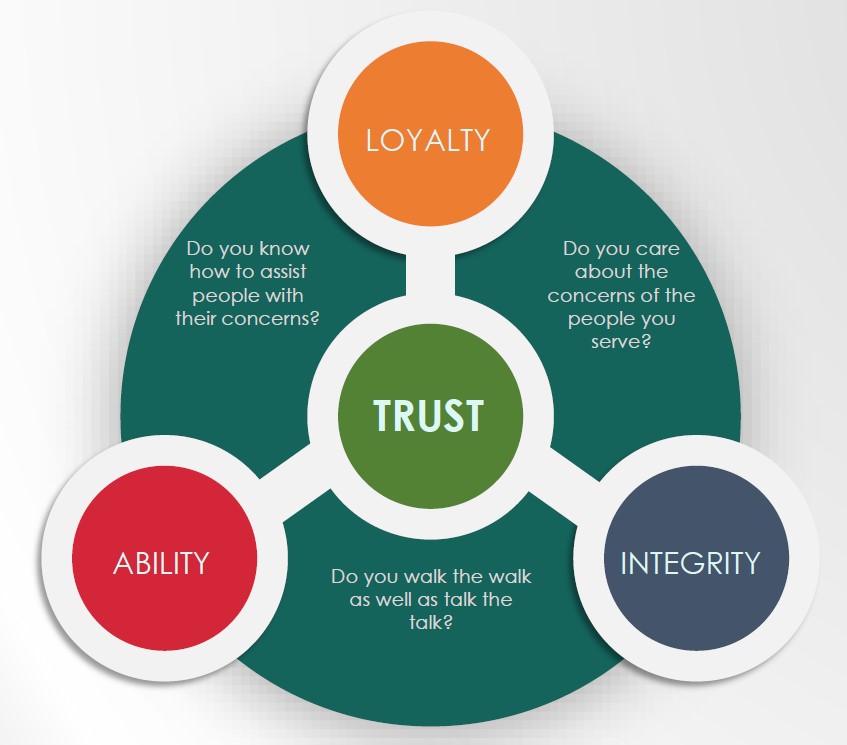The CRCA
Building Trust
 We have been looking at the importance of influence. I am been making the point that to be truly effective as a leader in a church – in good times and in challenging times – leaders must master the ability to influence others. Influence begins with practicing Ministry IQ - getting to know the people you are serving and for these people to get to know you. In addition, a leader also needs to promote vision. Now I want to address the matter of building and maintaining trust.
We have been looking at the importance of influence. I am been making the point that to be truly effective as a leader in a church – in good times and in challenging times – leaders must master the ability to influence others. Influence begins with practicing Ministry IQ - getting to know the people you are serving and for these people to get to know you. In addition, a leader also needs to promote vision. Now I want to address the matter of building and maintaining trust.
Building and maintaining trust is essential for leading. John C. Maxwell maintains that "trust is the foundation of leadership." (Leadership 101) Without trust, leaders may be able to force people to comply, but they’ll never tap the full commitment, capabilities, and creativity people can offer. As a leader you might have had trust among the people you serve, but once trust is broken, it is very difficult to maintain your influence. We have just witnessed what happens when trust is broken with the recent national elections in Australia. Our former prime minister lost the trust of the people and he was voted out of office. This happens in politics, and it also happens in the church. When pastors or other church leaders lose the trust of the people they serve, influence is gone, and they most often have to vacate their position or step down from their ministry roles.
So how do you build and maintain trust as a leader in the church? 
This will require three things: integrity, loyalty, and ability. First: integrity. In the Bible we are told: “The person of integrity walks securely…” (Proverbs 10:9). King David, as a person and as a leader walked before God in integrity of heart (Psalm 78:72). And God tells Solomon to be just like his father (1 Kings 9:4). Effective leaders walk in integrity (see also Job 2:3; 1 Chronicles 29:17; Nehemiah 7:2). Integrity is not what we do as much as who we are. And who we are, in turn, determines what we do. Our values are so much part of us that we cannot separate it from ourselves. We not only talk the talk, but walk the walk. An influential leader will never ask a person do anything unless they too are committed to do likewise. They lead by their example. Again to quote John C. Maxwell, "character makes trust possible. And trust makes leadership possible." (Leadership 101)
To build and maintain trust requires not just integrity, but also loyalty. We looked at this already when we looked at MinistryIQ. Influential leaders care about the concerns of the people they serve or are trying to reach. We see this in the life of our Lord Jesus. He said of himself, “...the Son of Man did not come to be served, but to serve, and to give his life as a ransom for many.” (Matthew 20:28) In fact, Jesus laid down his life for others. That is what love for people does. It sacrifices. It serves. It gives. Jesus’ focus was on serving others rather than serving himself or being served by others. Real servant leadership. We see this also in the apostle Paul. In Acts 17:16 Luke tells us that Paul "was greatly distressed to see that the city was full of idols." Here we see Paul's heart for the people around him. To the church in Colossae Paul writes: "I want you to know how hard I am contending for you and for those at Laodicea, and for all who have not met me personally. My goal is that they may be encouraged in heart and united in love...." (Colossians 2:1-2) Paul's life and his works make it evident to us that he deeply cared for those he served. It is no wonder that he had so much influence as a church leader.
In addition to integrity and loyalty, if you want to build and maintain trust as a leader, you need to have ability. You need to know how to assist people with their concerns. Imagine the situation when someone comes to you with a problem for you to solve. Suppose you say to them, "I don't know how to assist you." Now it is a given that you as a leader will not know how to solve every problem or assist people in every way. There have been many times in life and ministry when I did not have all the answers to the questions people posed to me. But at those times I would point them in the right direction or refer them to others who will be able to assist. This builds and maintains trust. People will see you as someone they can turn to for assistance.
If you desire to be a leader that influences others, then build and maintain trust. Walk in integrity of heart, be loyal to those you serve, and show ability to assist others. So doing, you will build trust among those you serve.
When you subscribe to the blog, we will send you an e-mail when there are new updates on the site so you wouldn't miss them.


Comments